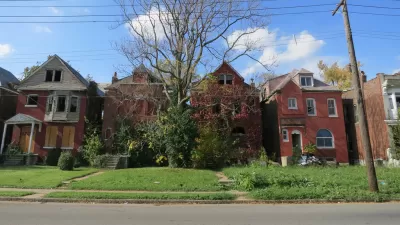As the federal and several state governments continue to allow costs for a college education to rise, local governments and business are looking for strategies to stem the tide.
A highly-educated population is a well-understood pillar of a strong economy. At risk with rising college costs is America's ability to educate those at the post-secondary level. As Noël Harmon and Blair Forlaw, of The Huffington Post report, "[c]ollege price tags have been rising for 30 years, up 570% between 1982 and 2011...That's almost four times the rate of growth in median family income."
The federal and state governments lack of progress in curbing rising costs has energized some regions, who are collaborating with private business to create more local and regionalized efforts at lowering the barriers to a college education. For example, in St. Louis, "area companies, educators, foundations, and government agencies, have set out together to raise post-secondary graduation rates."
Harmon and Forlaw spotlight three strategies St. Louis "has decided they must do if they are to make a significant difference." One is researching data, "to get to know college-goers better." The last two include encouraging innovation and taking advantage of opportunities to collaborate. All three hope to attack the cost of college, from both the standpoint of the student and of the educational institution.
Efforts such as these highlight the growing importance of local government initiatives to addressing such challenges as mobility, sustainability, and economic development.
FULL STORY: Metro Areas Take on College Affordability

Planetizen Federal Action Tracker
A weekly monitor of how Trump’s orders and actions are impacting planners and planning in America.

Restaurant Patios Were a Pandemic Win — Why Were They so Hard to Keep?
Social distancing requirements and changes in travel patterns prompted cities to pilot new uses for street and sidewalk space. Then it got complicated.

Map: Where Senate Republicans Want to Sell Your Public Lands
For public land advocates, the Senate Republicans’ proposal to sell millions of acres of public land in the West is “the biggest fight of their careers.”

Orange County, Florida Adopts Largest US “Sprawl Repair” Code
The ‘Orange Code’ seeks to rectify decades of sprawl-inducing, car-oriented development.

Maui's Vacation Rental Debate Turns Ugly
Verbal attacks, misinformation campaigns and fistfights plague a high-stakes debate to convert thousands of vacation rentals into long-term housing.

San Francisco Suspends Traffic Calming Amidst Record Deaths
Citing “a challenging fiscal landscape,” the city will cease the program on the heels of 42 traffic deaths, including 24 pedestrians.
Urban Design for Planners 1: Software Tools
This six-course series explores essential urban design concepts using open source software and equips planners with the tools they need to participate fully in the urban design process.
Planning for Universal Design
Learn the tools for implementing Universal Design in planning regulations.
Heyer Gruel & Associates PA
JM Goldson LLC
Custer County Colorado
City of Camden Redevelopment Agency
City of Astoria
Transportation Research & Education Center (TREC) at Portland State University
Camden Redevelopment Agency
City of Claremont
Municipality of Princeton (NJ)





























